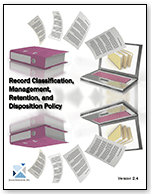Records management review mandated by executive management
Records retention and destruction policy now is a requirement
A record is essentially any material that contains information about your company’s plans, results, policies or performance. In other words, anything about your company that can be represented with words or numbers can be considered a business record – and you are now expected to retain and manage every one of those records, for several years or even permanently depending on the nature of the information. The need to manage potentially millions of records each year creates many new challenges for your business, and especially for your IT managers who must come up with rock-solid solutions to securely store and manage all this data.
Current rules and regulations regarding the protection and destruction of confidential and sensitive documents require that any person or company that possesses or maintains such information to take reasonable measures to protect against unauthorized access to, or use of the information in connection with its disposal. In addition Sarbanes-Oxley requires that records be retained for all audits and legal proceedings.
Read on Record Management Policy Order Records Management Policy Download Sample Policy

Reasons to Move Away From Tape Backups
The most frequent reasons world class CIOs use as a basis for moving away from tape-based backup and recovery solutions are:
Poor backup performance
- Tape systems have difficulty meeting shrinking backup windows
- Not conducive to the remote and off-site user requirements
- Daily and weekly incremental backups exceed the allotted time windows
- Recovery from physical tape is cumbersome
Lengthy recovery time
- Difficult to recover in a "user" environment
- Recovery of business-critical data and applications from tape can take many hours, if not days
- Ironically, the "best practice" of using off-site tape repositories adds to recovery time
Increasing operational and capital costs
- Tape deployments are costly and cumbersome to maintain
- Adding capacity to existing tape libraries and upgrading tape drive technology to non-compatible, higher-capacity media is costly
- Ongoing service, support, and warranty is high, especially for aging tape systems
Reduce and eliminate risks from defective, lost or misplaced tapes
- Shipping tape cartridges to off-site repositories exposes firms to security breaches and risks due to loss
- Defective media can result in risk of unrecoverable data
- IT organizations must invest in tape encryption and key management systems to alleviate security risks, which adds cost and complexity
- The "human element" involved when handling tape adds to risk of data loss and increases operational costs
Poor storage efficiency
- Explosion in the growth of redundant data using tape back up -- can not easily use data de-duplication techniques
- Tape-based compression is typically only 2:1 resulting in many sets of media - typically 1 TB of data needs 25 TB of media using the generation tape archiving concept
- Need to move to another media type to gain additional capacity
- Tape is not always read or write compatible
Read On... Order Backup Policy Download Sample Backup Policy




